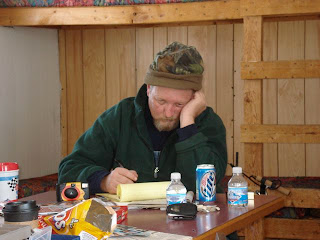Anonymous Issues
The voice of Dr. Donald Kerr, Principle Deputy Director of National Intelligence, was intercepted recently speaking to a gathering of muckety mucks at an intel symposium held somewhere in the bowels of San Antone, Texas. The knees of some of the more aggressive liberals in the land instantly jerked in harmonic response to an excerpt of his prepared remarks regarding modern anonymity.
“Too often, anonymity is equated with privacy…Anonymity, or at least the appearance of anonymity, is quickly becoming a thing of the past…protecting anonymity isn’t a fight that can be won.”
Ehh…it’s sorta hard to conjure up what the Doc is talking about. Most of the turkey hunters around these parts like to think they disappear when they don their cammy’s in the woods and, well, if you tell ‘em there’s a fight they can’t win then you better stand back because fisticuffs will most likely ensue.
But then, just to stir up even more confusion, Dr. Kerr finished it off with the following bit of wisdom:
“I think people here, at least people close to my age, recognize that those two generations younger than we are have a very different idea of what is essential privacy, what they would wish to protect about their lives and affairs. And so, it’s not for us to inflict one size fits all. It’s a need to have it be adjustable to the needs of local societies as they evolve in our country. Eventually, we can only hope that people’s perceptions – in
Let’s see, now, that statement should be perfectly understandable to everyone here. People’s perceptions, in Hollywood and elsewhere, need to catch up to…ahhh…catch up with….err-umm…maybe, oh, catch up to the perceptions of the G-man’s perception of what the young folks are thinking.
No, most likely the Doc was trying to say that all confounding and opposing concepts of essential privacy will soon merge into one humongous, new and undeniable perception that spreads across “local societies” like a plague of indiscriminate locusts.
Yeppir. Uh-huh.
Well, rather than relying on an idiot who cuts and pastes little bits of speeches somewhat randomly, to fully gather the context of Dr. Kerr’s remarks, you may need to read the complete text of his talk here.
Some may be relieved to read all of his speech. You may find that his emphasis on the difficult balance of safety and privacy is not nearly as scary as some of the more aggressive among us might suggest.
Of course, personal identities are easier to figure out if you are a G-man. Cutting out most of the red tape, a simple signing statement from the Big Guy will expeditiously do the trick.
But even if you’re just a mild mannered CEO, all it takes today is a timely subpoena from your well-paid legal department to get phone company or internet service provider executives shaking in their boots, turning over private membership records and subscription details, ratting out the disgruntled employees, dangerous Libertarians and annoyingly unnamed whistle blowers of the world quicker than you can say, “I didn’t do it, man!”
Taking that object, economical lesson a step further, it seems our CEO’s and Superstars don’t need or want anonymity so why should we little people cry about it? (Really, if they want that, they can take it to the Caymans or Austria or some other UnAmerican place where it belongs, right?) So what makes us so special? Can you imagine if we could all count on a certain degree of anonymity…what the hell would we say?
Some might recollect openly on what privacy once meant in this nation. Some might say without anonymity some good calls might have never been made and some good stories might have never been told.
Then again, based on our history, others might wax on about how old notions of anonymity were rarely bueno anyway. Perhaps the only ones who ever truly enjoyed all the benefits of anonymity were communists, gangster-types, hooded bigots and their legion of innocent victims. Today, sifting through everybody’s trash is the only proper way to ensure the evil doers, wing-nuts and whack jobs will ever be removed from the gene pool and anonymity has naturally evolved into the Dodo bird of personal privacy.
Maybe we didn’t need anonymity amongst our neighbors if we did have it. Hey, the vast majority of us law-abiding citizens who humbly exist somewhere below the CEO/Professional Athlete strata still have nothing to hide and nothing to fear but fear itself. But, Dog, if you ever believed that all Americans once enjoyed that small comfort of individual confidentiality known as the right to anonymity, be advised that they don’t anymore.
That’s really the drift here. How much privacy are we willing to trade for safety? This is the honest, open debate that we need to have in this country. Like Dr. Kerr says, we don’t need to hold back any longer. We can see where this is going. We know everything we need to know about the subject right now and we have no reason to be afraid of speaking privately among ourselves about this. We don’t need to wait for G-men, self-righteous talking heads,
But, umm, correct me if I’m wrong, that seems to be exactly what we are doing...makes you wonder why, doesn't it?
Cheers,
Anon

